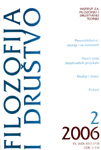Fuko versus Habermas: Moderna kao nedovršeni projekat naspram teorije moći – neizbežna suprotstavljenost ili mogućnost komunikacije
Foucault versus Habermas: Modernity as an Unfinished Endeavor vs. the Theory of Power – An Inevitable Conflict or Possibility of Communication
Author(s): Marjan Ivković Subject(s): Philosophy
Published by: Institut za filozofiju i društvenu teoriju
Keywords: modernity; discourse; intersubjecitvity; Habermas; power; practices; Foucault; history; genealogy; complexity; enlightenment;
Summary/Abstract: The paper considers the possibility of detecting points of contact between Michel Foucault’s theory of power and the theory of communicative agency formed by Jurgen Habermas. In the beginning, the development of the philosophical discourse of modernity, which Habermas analyzes in his work bearing the same title, is laid out, with the aim to gain insight into the nature of Habermas’s critique of Foucault. After having reviewed some of the basis of Foucault’s theory, the author points out Habermas’s depiction of the theory of power as the pinnacle of Nietzschean, anti – modernist stream of the philosophical discourse. The critique is based on Habermas’s assumption that Foucault’s analyses of power fails to comprehend the complexity of modernity. Foucault, according to Habermas, over – emphasizes one dimension of the process of modernization – gradual strengthening of the disciplinatory power based on the "control of the spirit".The author, however, wishes to point out the importance the theory of power ascribes to the preservation of insight into the complexity of history. Through the insight into multiple and divergent nature of historical processes that are responsible for the formation of modern society, the individual becomes historically self – conscious and able to step out of the paradigm of self – relating subject. As the theory of communicative agency also tends to transcend the "limits of the subject – philosophy", the author concludes that Foucault’s work is, to the same extent as Habermas’s, imbued with the idea of "modernity as an unrealized undertaking". Towards the end of the paper the author analyzes Foucault’s relation to Enlightenment, in order to show the essentially modern nature of his thought.
Journal: Filozofija i društvo
- Issue Year: 2006
- Issue No: 30
- Page Range: 59-77
- Page Count: 18
- Language: Serbian

